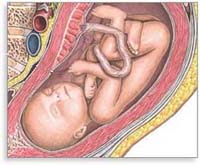
Dealing With Nasal Congestion During Pregnancy
Nasal congestion is a common symptom of being pregnant. It’s not really a complication because it so common and because it is caused as a direct result of the hormones present in your system while you are pregnant, specifically estrogen. Nasal congestion – also known as rhinitis of pregnancy – will affect between 20 and 30 percent of all pregnant women. It can start as early as your 8th week and may even last until you have given birth to your baby. The increased level of estrogen during pregnancy contributes to swelling in the mucous membranes lining the nose and may even cause you to produce more mucus. Add to this the fact that you have an increased level of blood throughout your blood vessels – which expand while you are pregnant – and you have the wonderful effect of nasal congestion and increased chances of nose bleeds.Nasal Congestion, or Something Else?
In most cases just a stuffy nose will more than likely be just a symptom of your pregnancy, but should you have any other symptoms, then you may be coming down with something or another infection. These other symptoms may include:- Sneezing, coughing
- Sore throat
- Mild aches and pains
- Possibly swollen glands
- Fever
Best Way To Relieve Nasal Congestion
It is very important that when you do blow your nose you don’t cause any damage to the delicate nasal membranes – and to ensure this you need to use the correct method to blow your nose. Use your thumb to close one nostril, and gently blow out the other side. Repeat with the other nostril until you can breathe again. There are other steps which you should take to try and prevent nasal congestion from getting too bad. These include:- Keep yourself well hydrated during the day
- Sleep with your head slightly elevated if possible
- Take a warm shower or bath (below 100F or 37.7c). Steam can temporarily help relieve congestion
- Antihistamines and nasal sprays are off-limits, but you should be able to make use of saline nose drops. Your health care provider should be able to recommend this to you
- Use a humidifier or vaporizer to put more moisture into the air and keep it near your head at night. Be sure to follow the cleaning instructions that came with your humidifier. Change the water daily since it can become a breeding ground for bacteria
- Avoid potential irritants, such as cigarette smoke and alcohol (which you should already be avoiding!) Talk to your health care provider about talking additional Vitamin C, or increase your intake of Vitamin C rich foods, as these should help keep the nasal capillaries stronger
Is There Medication Which Is Safe To Take?
If you are suffering from nasal congestion and you have tried the options above, but nothing seems to work and you are desperate for some relief, then you should speak to your health care provider. Let him/her know what you have tried. Your health care provider may have some other options, or some medication which he/she may recommend you take. Generally you will want to avoid taking medication during the first trimester, but if your health care provider gives you the go ahead, then he or she may recommend a decongestant. If possible, use this as an absolute last resort.Nasal Congestion



